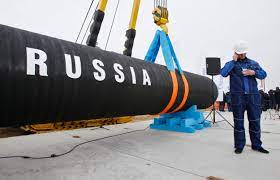Putin’s regime has been slapped with sweeping sanctions after its invasion of Ukraine, but Europe’s appetite for Russian gas shows no signs of waning, BusinessInsider report.
Gazprom, the Kremlin-controlled energy giant, announced on Sunday morning that gas exports to Europe through Ukraine are proceeding as planned.
According to a Bloomberg report on Friday, figures from Ukraine’s grid operator indicated that gas exports to Europe through Ukraine increased by 40% on Thursday, the day of the invasion.
So far, Russia’s oil and gas have been exempt from Western sanctions.
The Continent Heavily Dependent on It
The North Sea oil field once provided reliable gas supplies to Europe – which has now all but run out. On the other hand, Russian reserves of natural gas are among the largest in the world.
Approximately 40% of Europe’s gas comes from Russia – more than twice as much as Norway, its next-largest supplier.
William Jackson, an economist at Capital Economics, estimates that Russia will sell about $100 billion worth of oil and gas to Europe as at 2021. Meanwhile, Gazprom supplied roughly one-third of the gas to Europe in 2020.
Germany Relies on Russian Oil
Over half of Germany’s gas comes from Russia, the largest economy in Europe. During the past few years, Germany has been phasing out nuclear power in favor of gas, and they have been working on a new pipeline to bring in more gas from Russia.
The Nord Stream 2 project was suspended by Germany shortly after Russia invaded.
Costs are Relatively Low
According to analysts, market forces raised the price of non-Russian gas on the day of the invasion, which led to increased European imports of Russian gas.
BloombergNEF analyst Stefan Ulrich said on Thursday that non-Russian gas prices are “well above the likely sales price for many Gazprom import contracts.”
The former chair of the Department of Energy Systems at the Institute for Energy Technology at Berlin University of Technology, Georg Erdmann, told CNBC that the gas industry “assumes Russia to be a rather reliable commercial partner” that fulfils its long-term contracts.
Legislators are Watching Consumer Energy Costs
Europe has endured a winter of rising gas prices, resulting in higher home energy bills. European legislators are now cautious about scaring their voters with the threat of further price increases.
In the event of a disruption to gas imports, European Commission President Ursula von der Leyen has insisted the EU would be able to cope.
Europe Slow Transition into Renewable energy.
Renewable energy has been a priority for the EU, but the expansion isn’t happening fast enough to ease dependence on Russian energy.
According to the EU’s Directorate-General for Energy, 25% of the bloc’s energy comes from natural gas. The remainder is derived from oil and petroleum (32%), solid fossil fuels such as coal (11%), and renewable energy and biofuels (18%).
Tim Schittekatte, a research scientist at the MIT Energy Initiative, told CNBC: “There is simply not enough grid capacity now to take up more renewables in some parts of Europe.”
European Crops Survives on Russia Gas
Throughout Europe, fertilizer is made with gas, including ammonium nitrate and urea. The disruption of gas supplies also impacts the continent’s ability to grow crops and feed its people.

